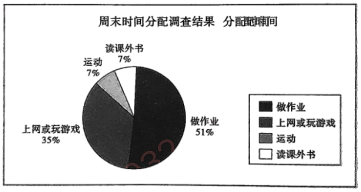1 . I read somewhere that we spend a full third of our lives waiting. But where are we doing all of this waiting, and what does it mean to an impatient society like ours? To understand the issue, let’s take a look at three types of “waits”.
The very purest form of waiting is the Watched-Pot Wait, It is without doubt the most annoying of all Take filling up the kitchen sink(洗碗池)as an example. There is absolutely nothing you can do while this is going on but keep both eyes fixed on the sink until it’s full. During these waits, the brain slips away from the body and wanders about until the water runs over the edge of the counter and onto your socks. This kind of wait makes the waiter helpless and mindless.
A cousin to the Watched-Pot Wait is the Forced Wait. This one requires a bit of discipline. Properly preparing packaged noodle soup requires a Forced Wait. Directions are very specific. “Bring three cups of water to boil, add mix, simmer three minutes, remove from heat, let stand five minutes.” I have my doubts that anyone has actually followed the procedures strictly. After all, Forced Waiting requires patience
Perhaps the most powerful type of waiting is the Lucky-Break Wait. This type of wait is unusual in that it is for the most part voluntary. Unlike the Forced Wait, which is also voluntary, waiting for your lucky break does not necessarily mean that it will happen.
Turning one’s life into a waiting game requires faith and hope, and is strictly for the optimists among us. On the surface it seems as ridiculous as following the directions on soup mixes, but the Lucky-Break Wait well serves those who are willing to do it. As long as one doesn’t come to rely on it, wishing for a few good things to happen never hurts anybody.
We certainly do spend a good deal of our time waiting. The next time you’re standing at the sink waiting for it to fill while cooking noodle soup that you’ll have to eat until a large bag of cash falls out of the sky, don’t be desperate. You’re probably just as busy as the next guy.
1. While doing a Watched-Pot Wait we tend to __________.| A.keep ourselves bus | B.get absent-minded | C.grow anxious | D.stay focused |
| A.The Forced Wait requires some self-control. | B.The Forced Wait makes people passive. |
| C.The Watched-Pot Wait needs directions. | D.The Watched-Pot Wait engages body and brain. |
| A.It is less voluntary than the Forced Wait. | B.It doesn’t always bring the desired result. |
| C.It is more fruitful than the Forced Wait. | D.It doesn’t give people faith and hope. |
| A.Take it seriously | B.Don’t rely on others | C.Do something else | D.Don’t lose heart |
1.描述图表内容;
2.分析所反映的问题;
3.提出你的看法。

注意:1.词数100左右;
2.可以适当增加细节,以使行文连贯;
3.信的开头和落款已为你写出,不计入总词数
Dear Mr. Johnson.
Recently volunteers have conducted a survey about how the students spend their weekends.
____________________________________________________________________________________________________________________________________________________________________________________________________________________________________________________________________________________________________________________________________________________________________________________________________________________________________________________________________________________________________________
Yours,
Li Hua



